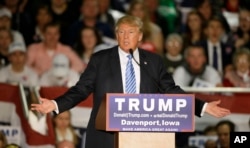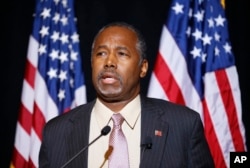A new U.S. political survey shows Texas Senator Ted Cruz, with strong support from evangelical Christians and conservative activists, has surged to the top among Republican presidential candidates in Iowa, the the farm state holding the party's first 2016 nominating contest.
The Des Moines Register/Bloomberg Politics poll late Saturday said Cruz, who delights in agitating against Republican and Democratic political leaders alike in Washington, is now winning the support of 31 percent of Republicans likely to vote in the February 1 party caucuses, outdistancing billionaire real estate developer Donald Trump with 21 percent.
Trump and another political novice, former neurosurgeon Ben Carson, had led previous surveys in recent months in the central U.S. state, but Cruz showed a 21-percentage-point gain since October.
In the latest survey, conducted last week, Cruz collected 45 percent of people who consider themselves to be evangelical Christians and 39 percent of tea party conservatives who call for cutting the power of the federal government and its spending.
In Washington, Cruz is best known for leading the 16-day partial government shutdown in 2013 in what turned out to be a failed effort to overturn President Barack Obama's signature domestic legislative achievement, passage of national health care reforms commonly known as Obamacare.
Pollster Ann Selzer described the Iowa survey results as a "big shakeup. This is a sudden move into a commanding position for Cruz."
Another poll last week in Iowa done by Monmouth University also showed Cruz pulling ahead of Trump, but by a narrower margin, while a CNN/ORC poll showed Trump still ahead in the state.
Nationally, polls show Trump with commanding edges over Cruz, Carson, Florida Senator Marco Rubio, former Florida Governor Jeb Bush, the son and brother of two former U.S. presidents, and the rest of the large Republican field.
As state-by-state nominating primary elections and caucuses draw closer, U.S. voters appear to be paying closer attention to the candidates, who already have been campaigning for months. As a result, surveys in the individual states are showing fluctuating support for the contenders as voters narrow their choices.
Surveys show former Secretary of State Hillary Clinton with a commanding lead in the race for the Democratic presidential nomination. The winner of next November's national election will replace Obama, who leaves office in January 2017.








